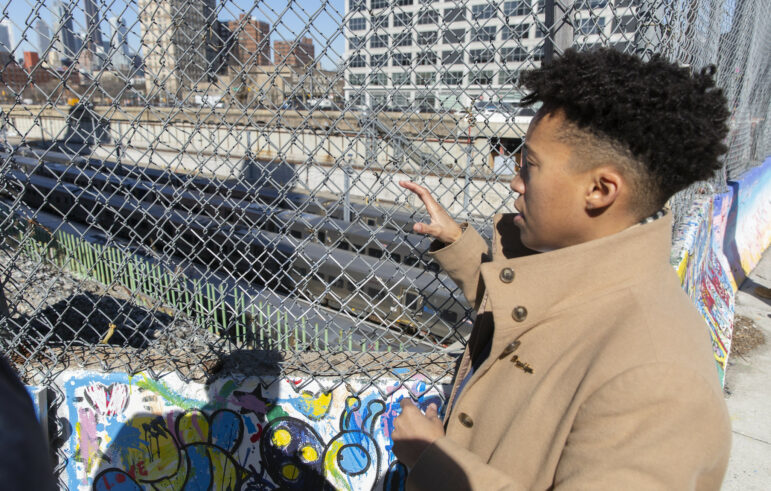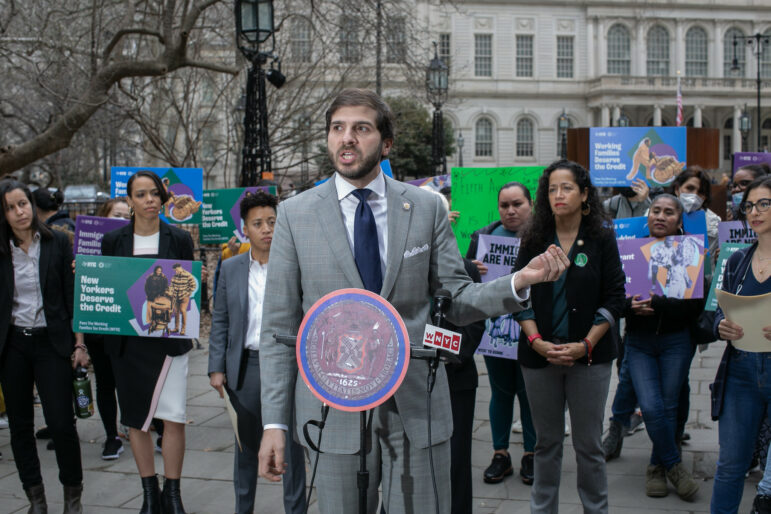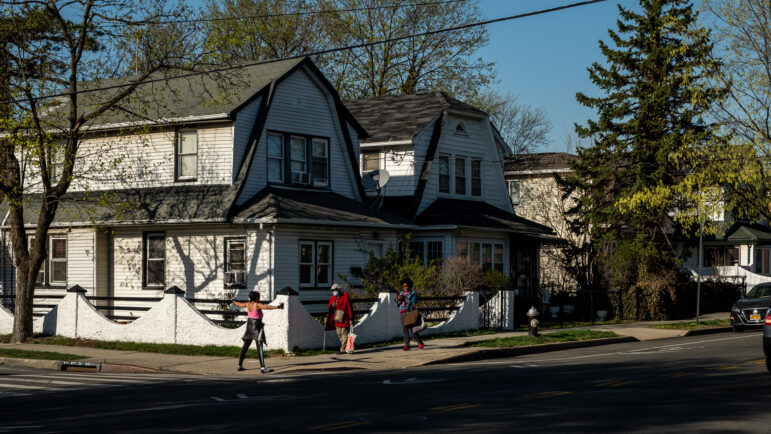Gov. Kathy Hochul signed a package of bills that aim to combat substance-use disorders, including one that will bring medication assisted treatment to prisons and jails across the state and another to decriminalizes the possession and sale of hypodermic needles.
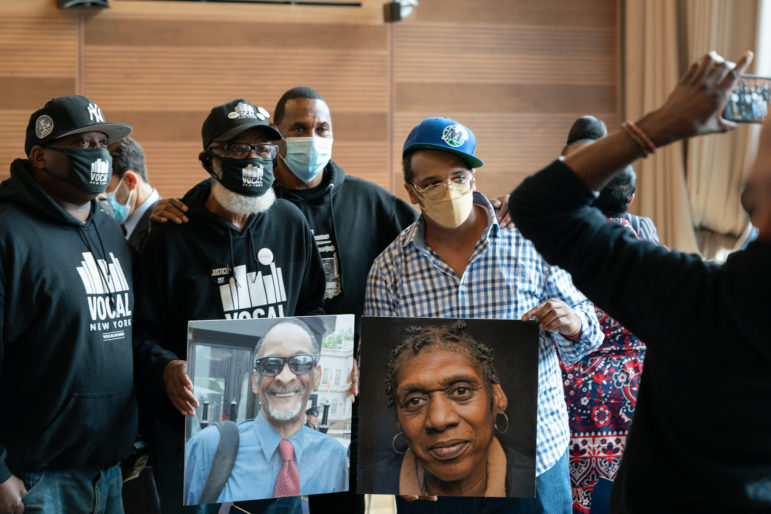
Office of Gov. Hochul
Overdose prevention advocates from VOCAL-NY at Thursday’s bill signing.At a press conference in Manhattan on Thursday, New York Gov. Kathy Hochul shared a story that will likely sound familiar to thousands of people and families across the state: How several years ago, her teenage nephew Michael cut his hand using equipment at the deli where he worked. He went to the doctor, who prescribed an opioid-based medication for the pain.
“He follows the doctor’s directions,” Hochul told the crowd. But the pain persisted. The doctor wrote another prescription. “Next thing we know, he’s developed an addiction,” the governor said. “He starts going to the streets. Streets are cheaper, easier. He hides it from his mom as long as he can. He gets into trouble, ends up in jail.”
This cycle continued, Hochul explained—“addiction, trouble, streets, homeless shelter”—until around six years ago, when it seemed like her nephew “was starting to turn the corner.” He was back in school and coaching other people in their recovery. But one day he used drugs that had been laced with the powerful opioid fentanyl. “We buried him a few days later,” Hochul said.
More than 5,112 people died from overdoses in New York State last year, 2,192 of them in New York City, according to Centers for Disease Control and Prevention data. After years of pushing for measures to stem the crisis, Hochul on Thursday signed a package of five related bills that advocates say mark a shift in how the state deals with substance use and substance use disorders.
The newly-signed legislation includes one that decriminalizes the possession and sale of syringes and hypodermic needles, which supporters of the harm-reduction model say discourages safer drug use practices and contributes to the transmission of blood-borne illnesses like HIV and hepatitis.
Until now, syringe possession was still a class A misdemeanor under state law, despite the fact that New York authorizes and funds syringe exchange and access programs. While participants in needle exchanges are legally authorized to carry syringes, that didn’t always protect them from criminal enforcement, experts say.
“All Syringe Service Programs (SSPs) provide cards to participants that should allow them to legally carry syringes. However, we know from experience that it is quite common for NYPD to disregard the cards or not recognize them as valid,” said Sam Rivera, executive director for OnPointNYC, which runs one of the city’s largest syringe exchange programs in Upper Manhattan, in an emailed statement.
“Legal access to safe use supplies that includes sterile syringes is vitally important to support health and safety for people who use drugs,” he added.
READ MORE: Decade-Long Fight to Decriminalize Syringe Possession in NY Awaits New Gov’s Signature
The other bills Hochul signed into law Thursday include one that will require New York to establish a program for providing medication assisted treatment, known as MAT, for people with subtance use issues who are being held in prisons and jails across the state. Such treatment is available in some New York correctional facilities, but its use and accessibility has been inconsistent from place to place, advocates say.
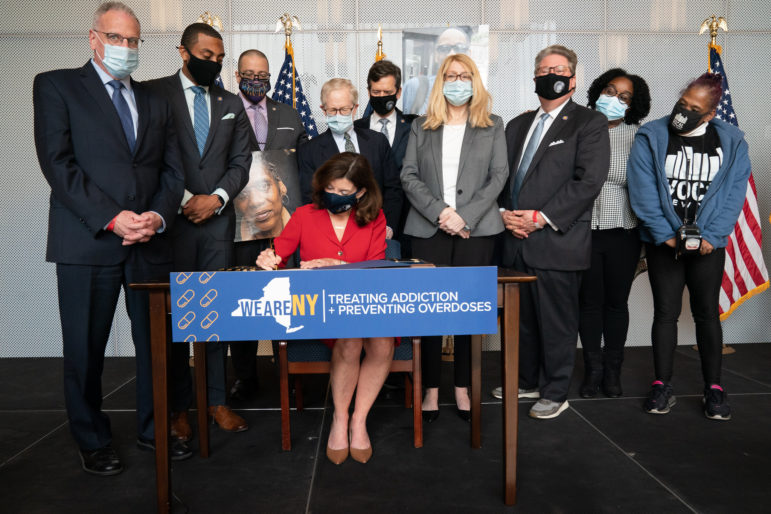
Office of Gov. Hochul
Hochul signs a package of overdose prevention bills on Oct. 7. 2021.“Many of us in this room thought this day would never come,” State Assemblywoman Linda Rosenthal, who sponsored the MAT legislation, said at the bill-signing event. More than 80 percent of incarcerated people have a substance use disorder, she said, but only 20 percent of state prisons and less than half of New York’s local jails provide the treatment.
“Struggling with addiction is not a criminal act, nor is it a moral failing, and providing sick people with health care should not be considered revolutionary,” the lawmaker said, saying the new law will require jails and prisons to “to treat addiction like any other health condition and provide medication instead of punishment.”
The other legislation signed Thursday includes bills that prohibit the carrying of lifesaving anti-overdose drugs like Naloxone from being used in court as evidence of illegal drug possession, and another that requires the state to establish an online directory of locations where the public can obtain those drugs. The fifth bill expands the number of crimes for which defendants can be eligible for substance use treatment in lieu of time behind bars.
“There’s hope behind these bills,” Hochul said, saying she was signing the package of laws for “all the Michaels out there who are struggling.”
“We have to send a message, we are there with you,” she said. “That is the message that has to be shouted out across this state.”
Advocacy group VOCAL-NY hailed the new laws as historic, saying they “will begin to reverse the harm caused by the Cuomo administration.” But they and others who work around substance use continue to call for Hochul to make additional policy changes, including doing away with a state rule that requires patients with Medicaid to get prior authorization from their insurer to access all forms of MAT, which they say creates an extra hurdle for those seeking treatment.
They are also pushing the governor to authorize a pilot program to open five Overdose Prevention Centers across the state—something advocates say former Gov. Andrew Cuomo promised he would do when running for re-election in 2018, but never delivered on.
READ MORE: Safe Injection Site Supporters Push Hochul to Fulfill Cuomo’s Pledge for Overdose Prevention Pilot
Such centers, also known as Safe Injection Sites, are already in use in places like Europe and Canada, and provide dedicated spaces where people can use intravenous drugs under supervision, with staff on site to intervene in the case of an overdose.
At Thursday’s press conference, Assemblywoman Rosenthal brought up the Overdose Precention Center pilot, essentially nudging Hochul on the issue.
“I have many other bills for you to sign, Including the bill to authorize OPC,” she quipped into the microphone. “But that’s for another day.”


